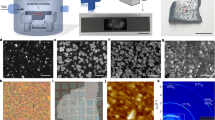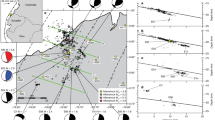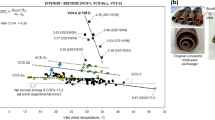Abstract
Natural tritium production by the reaction, 63Li(n, α)31H, may in some circumstances lead to 3H contents in the fracture fluids of a granite, which are significantly above the present natural 3H content (0.5 tritium units, TU) of pre-bomb precipitation. We show here that the principal factors which determine the 3H content of the fracture fluids are the U, Th, Li and B contents of the rock and its matrix porosity. Granites with high U, Th and Li contents; low B content and a low matrix porosity may have a naturally maintained 3H content of up to about 2.5 TU in water within the matrix. This has important implications for the interpretation of groundwater flow patterns from their 3H contents. Whereas it has generally been assumed that ground-waters with 3H contents greater than 0.5 TU have a proportion of post-1954 recharge present, this may not always be a valid conclusion.
This is a preview of subscription content, access via your institution
Access options
Subscribe to this journal
Receive 51 print issues and online access
$199.00 per year
only $3.90 per issue
Buy this article
- Purchase on Springer Link
- Instant access to full article PDF
Prices may be subject to local taxes which are calculated during checkout
Similar content being viewed by others
References
Foster, S. S. D. & Smith-Carrington, A. J. Hydrol. 46, 343–364 (1980).
von Buttlar, H. & Libby, W. F. J. Inorg. nucl. Chem. 1, 75–91 (1955).
Cameron, J. F. in Radioactive Dating and Methods of Low-level Counting 543–573 (IAEA, Vienna, 1967).
Hughes, D. J. & Schwarz, R. B. Report BNL-325 (Brookhaven National Laboratory, New York, 1958).
Zito, R., Donahue, D. J., Davis, S. N., Bentley, H. W. & Fritz, P. Geophys. Res. Lett. 1, 235–238 (1980).
Parker, R. L. U.S. geol. Surv. Profess. Pap. 440–D (1967).
Feige, Y., Oltman, B. G. & Kastner, J. J. geophys. Res. 73, 3135–3142 (1968).
Hall, D. H., Black, J. H. & Storey, B. C. Rep. ENPU 81–10, (Institute of Geological Sciences, London, in the press).
Nelson, P. et al., Rep. LBL-8280 (Lawrence Berkeley Laboratory, University of California 1979).
Edmonds, E. A., McKeown, M. C. & Williams, M. British Regional Geology: South West England (Institute of Geological Sciences, London, 1975).
Burgess, W. G., Edmunds, W. M., Andrews, J. N., Kay, R. L. F. & Lee, D. J. The Origin and Circulation of Groundwater in the Carnmenellis Granite: the Hydrogeochemical Evidence (Institute of Geological Sciences, London, 1982).
Beer, K. E., Edmunds, W. M. & Hawkes, J. R. Energy 3, 281–292 (1978).
Hawkes, J. R. & Dangerfield, J. Proc. Ussher Soc. 4, 158–171 (1978).
Alderton, D. H. M., Pearce, J. A. & Potts, J. A. Earth planet. Sci. Lett. 49, 149–165 (1980).
Tammemagi, H. Y. & Wheildon, J. Geophys. J. R. astr. Soc. 38, 83–94 (1974).
Author information
Authors and Affiliations
Rights and permissions
About this article
Cite this article
Andrews, J., Kay, R. Natural production of tritium in permeable rocks. Nature 298, 361–363 (1982). https://doi.org/10.1038/298361a0
Received:
Accepted:
Issue Date:
DOI: https://doi.org/10.1038/298361a0
This article is cited by
-
Fusion Neutrons: Tritium Breeding and Impact on Wall Materials and Components of Diagnostic Systems
Journal of Fusion Energy (2019)
-
Groundwater flow in an ‘underfit’ carbonate aquifer in a semiarid climate: application of environmental tracers to the Salt Basin, New Mexico (USA)
Hydrogeology Journal (2016)
-
Mantle heat drives hydrothermal fluids responsible for carbonate-hosted base metal deposits: evidence from 3He/4He of ore fluids in the Irish Pb-Zn ore district
Mineralium Deposita (2014)
-
Residence times of shallow groundwater in West Africa: implications for hydrogeology and resilience to future changes in climate
Hydrogeology Journal (2013)
-
A possible in situ 3H and 3He source in Earth’s interior: an alternative explanation of origin of 3He in deep Earth
Naturwissenschaften (2010)
Comments
By submitting a comment you agree to abide by our Terms and Community Guidelines. If you find something abusive or that does not comply with our terms or guidelines please flag it as inappropriate.



